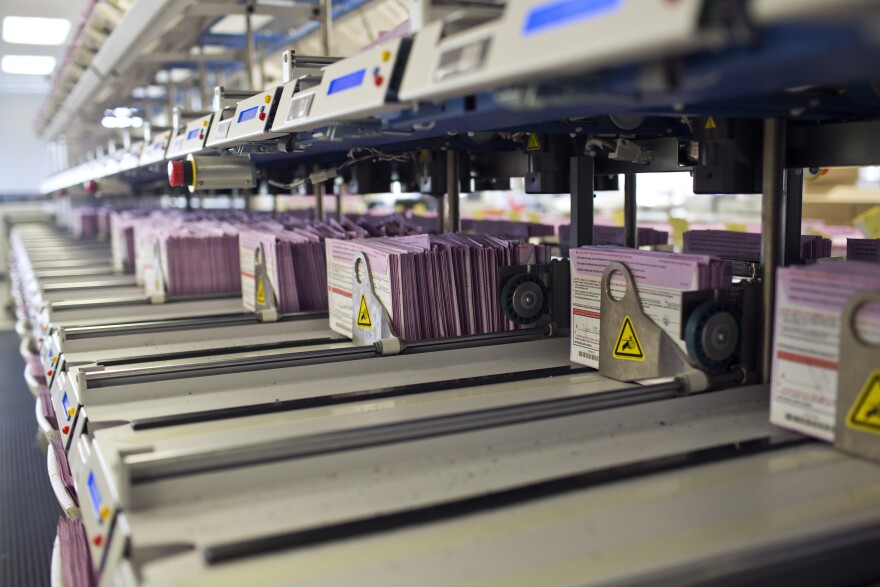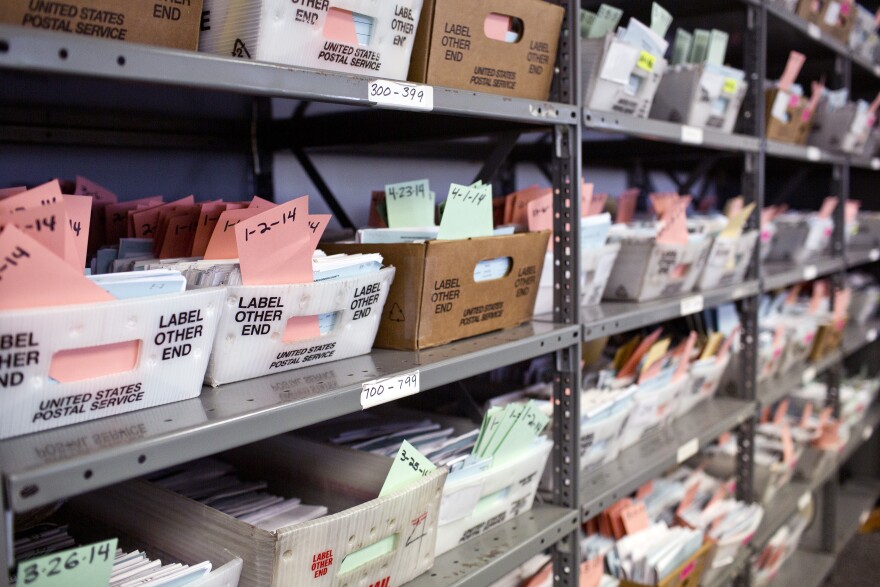This archival content was originally written for and published on KPCC.org. Keep in mind that links and images may no longer work — and references may be outdated.
Can this bureaucrat get young citizens to vote?
Dean Logan envisions a day very soon when the citizens of Los Angeles can vote in coffee shops, libraries, even convenience stores.
Logan, the county's registrar of voters, has a big vision for transforming voting behavior in Los Angeles County, especially among those in their teens and 20s.
It's a daunting challenge.
The June primary saw a record for low voter turnout, in large part because so many young people stayed away from the polls.
At a time when young citizens make up the fastest-growing segment of the potential voting population, only 2.7 percent of people aged 18-24 cast ballots in the June primary election in Los Angeles County, according to one study. That was 1 percent less than young adult turnout statewide.
The California Civic Engagement Project at UC Davis says that even when young people do register, they vote in far lower numbers than older people.
So Logan is expanding his youth voting outreach to include radio and mobile ads, building a new voting system from scratch and taking his voting show on the road to places like the Los Angeles County Fair and college campuses.
Last month he sent his outreach crew to Cal State Los Angeles to gin up some excitement among young voters on National Voter Registration Day.
Logan told the students, "We don't get our power from the position we hold, the title we have, the job that we have. We get our power from being registered voters."
It wasn't the best day for the event, because classes wouldn't start on the vast campus for another two days. But student activists and the Registrar's office signed up some 400 new voters, lured to the scene by free Korean tacos and hip hop music from a local radio station.
The added registrations were a win for the day, in what has been a losing battle to get young citizens to improve their representation in the voting population.
When KPCC met with voters from the Westside of Los Angeles last week we ran smack into this phenomenon.
We met James Wilson, 25, of Venice, who is registered, but not planning to vote. Asked to rate this election on a 10-point scale of relevancy to his life, he gives it a two.
He's not apathetic. He said he cares about health issues like labeling genetically modified foods. But nothing on this latest election cycle caught his interest.
"None of my friends talk about that stuff. I don't watch the news," he said.
Going to the polls, finding the polling place and a parking spot can be a hassle. He'd rather vote online.
"Like, for me, it would be cool if you went with your friends somewhere, and you're like, "Let's all go vote," even if it's by a coffee shop, or something like that, get some coffee, vote and hang out."
Logan is working on that.
His office is creating a touch screen tablet voters could use in more locations than just their local polling place near home.
It's still in the design phase, but the eventual system would let voters of many languages and various disabilities vote more easily in more locations. It would replace a voting system that is decades old and unappealing to younger voters, Logan said.
"The worst situation is to have somebody finally motivated and interested to vote, and then they show up and it's a clunky, difficult and inefficient process," Logan said.
The Board of Supervisors on Tuesday moved forward on Logan's dream of adopting a more modern voting machine, approving a contract of up to $15 million for Palo Alto design firm IDEO to complete the new system design and engineering specifications.
Logan has been interested in elections since he was a kid in Washington State, attending church picnics with his Democratic activist family.
"When I was ten years old a family friend from church ran for county office," Logan recalled during an interview at his Norwalk office. "For whatever reason, I got the bug by that, so throughout junior high and high school I volunteered on local political campaigns."
Logan won election to a county clerk post before heading up the state elections offices in Washington, and later Seattle's King County, Washington. He was named L.A. County's chief deputy registrar in 2007, and after a few months was promoted into the top job in 2008 when his predecessor vacated the post. He was appointed L.A.'s Registrar 2008.
He wears other hats as well — he's also county clerk and county recorder, responsible for overseeing official documents and vital records. At election time, it is his office that registers voters, sets up polling places and counts votes.
In L.A. County, he's been seen as an innovator.
His office is spending a quarter-million dollars this year putting registration and voting callouts online and on-air with popular radio stations like Power 106, Jack FM, and Spanish rock station SuperEstrella 107.1, among others.
He's also sending robocalls in Spanish, Mandarin and Korean to households likely to have speakers of those official balloting languages, looking for recruits to poll worker jobs.
He's getting results. Logan's office has registered 10 percent more of the population than his predecessor did. But turning young registered voters into actual voters remains a challenge.
In raw numbers, more than 800,000 new voters have registered since Logan was promoted from chief deputy to registrar in 2008. The county has 4.8 million voters, but Logan says another 1.2 million eligible citizens have not registered.
| Year | Registered voters | % of eligible voters |
|---|---|---|
| 2014 | 4,880,833 | 80.1 |
| 2012 | 4,512,336 | 75.6 |
| 2010 | 4,396,364 | 75.6 |
| 2008 | 4,021,954 | 69.7 |
| 2006 | 3,869,304 | 67.8 |
| 2004 | 3,791,322 | 67.1 |
| 2002 | 3,941,417 | 71.7 |
| 2000 | 3,927,253 | 73.3 |
Logan has recruited a roundtable of advocacy, faith-based, political and civil rights groups to promote registration, voting and working the polls on election day.
At one recent meeting, David Barron, a consultant and former Monterey Park city clerk, asked Logan what his office could do to get more people to run for local offices and make the races more interesting.
"Right now in the west San Gabriel Valley, there's no controversial elections, so voter turnout's going to be poor in Alhambra, Rosemead, Monterery Park," Barron said.
"And I would agree with you that that is the biggest driver in election turnout," Logan responds.
Ange-Marie Hancock, a USC political science professor, said many people vote as a kind of abstract civic duty, but that's not what drives voter turnout.
"People have to have something to vote for, and by vote for, I mean both 'kick the bums out', as well as 'I want to vote for this person and wanting to get them into office'," Hancock said.
So many things that repel voters are out of Logan's control. He doesn't set the dates and frequency of elections, for example. He's also not allowed to be partisan, which is why it makes sense to partner with community, faith-based and other groups.
"That's the limit of being the registrar versus being in some of these civic engagement organizations," Hancock said.
"He provides the tools and then he partners with the civic organizations so that they can actually do the kind of work that would inspire people to turn out to vote — give them something to vote for. "
Logan is blunt about the county's vote-by-mail system, which he would also like to change. It's growing in popularity, but it's not-user friendly. He uses his college grad son as an example.
"He's civically engaged and active, but he couldn't tell you the cost of a postage stamp," or sometimes his home mailing address, Logan says, "because it's just not part of his reality in terms of how he functions."
On Election Day, Nov. 4, Logan says he will vote in person at the polling place near his home, taking the opportunity to see the interaction of voters and poll workers and voting machines.
"The bar I put for myself is that we need to meet that person at that time when that trigger happens, so that when they decide, 'Okay, it's worth it to me to vote,' that they can actually do that," Logan said. "So that there's no barrier in the way."







